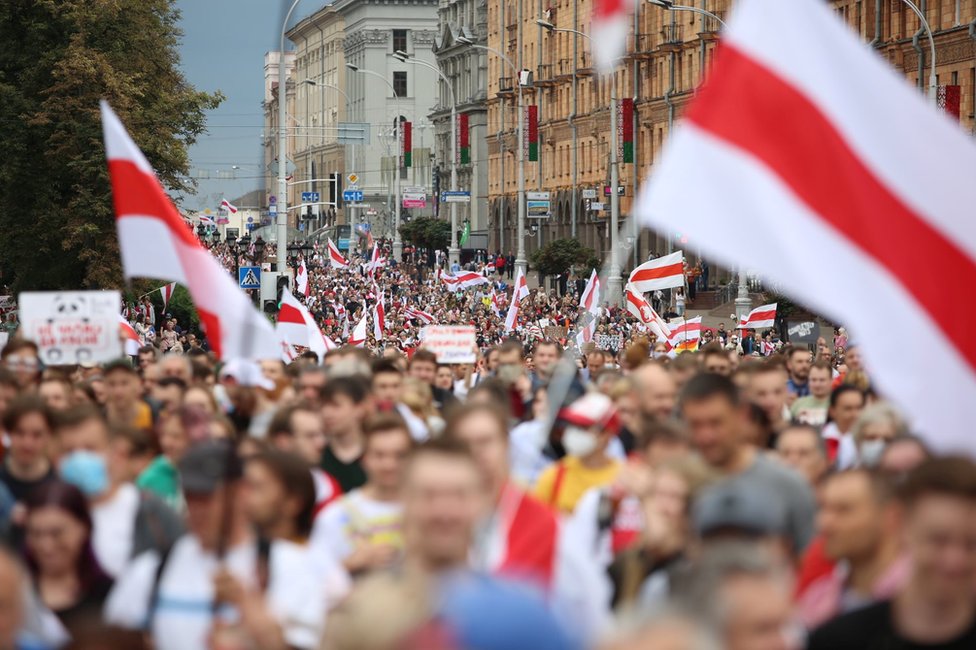Crédito: fuente
Tens of thousands of people have rallied in the Belarusian capital Minsk for a new protest against the president.
Riot police, backed by water cannon and barriers, sealed off parts of the city and a number of arrests were made, with reports of injuries.
Protesters seek the resignation of President Alexander Lukashenko.
They accuse the authorities of rigging his re-election just over a month ago, sparking deadly mass unrest.
At least four people have died and hundreds have been injured since then, as the government tried to stamp out dissent.
A number of opposition figures have fled the country, On Saturday, activist Olga Kovalkova became the latest to say she had taken refuge in neighbouring Poland amid threats of imprisonment.
-
What’s happening in Belarus?
- Belarus cracks down on journalists covering unrest
- ‘We can breathe for the first time in our lives’
Mr Lukashenko, in power since 1994, has accused Western nations of interfering.
Protesters, human rights activists and observers say riot police are brutally suppressing peaceful marches.
What is the mood in Minsk?
Sunday has become the key day for street demonstrations since the rallies began, the BBC’s Jonah Fisher reports from Minsk.

image copyrightReuters
image copyrightReuters
But riot police have intensified their efforts to intimidate and block the flow of people heading into the centre of city today, while detaining those taking part in the demonstrations, our correspondent says.
He adds that in the past few days the security forces – dressed all in black with balaclavas over their faces – targeted university students as they returned from their holidays, dragging some from the streets and university buildings into unmarked minivans.
Pictures on social media on Sunday showed armoured personnel carriers and water cannon vehicles driving into the centre of Minsk, some heading for Independence Square, which has been cordoned off.
One protester in Minsk who gave her name as Lyudmila told BBC News the demonstrators were undeterred by the security forces.
«We are definitely not ready to get back to the life we had for many years now,» she said.
«We finally feel like we matter because we’ve been living in apathy for way too long and now we just have this feeling of solidarity and we actually think that – well, I feel personally that – changes already are happening so that’s definitely not the time to give up.»
Lukashenko fails to stop protests once again
By Jonah Fisher, BBC News, Minsk
Sunday’s rally had several phases. The first was the tense and uncertain. Security forces had used razor wire to close off the obvious gathering points, Minsk’s main monuments and squares, and were standing guard behind them. Would-be protesters stood awkwardly on street corners wondering where and when the march would start.
Those in small groups were vulnerable and we watched as a man holding the outlawed red and white flag of the opposition was dragged into a car by security officers and driven away. Then, as the numbers grew, there were nervy stand-offs near Independence Square. As they grew in confidence the demonstrators approached, berating the riot police at the barricades that now blocked the road.
At about four in the afternoon the crowd swelled exponentially as people marched out of the centre. This was no longer the brave early arrivals, it was Belarusians young and old. Some were in fancy dress, others wearing clothes that directly mocked the riot police, the Omon.
There were families, children, dogs – someone even brought a goose. It’s hard to estimate numbers of this size from the ground but I’d say there were at least 100,000, possibly many more. For the fourth Sunday in a row President Lukashenko’s attempts to stop the protest against him failed.
Protests have also been reported in other Belarusian cities and towns including Grodno, Mogilev and Gomel.
What happened to Olga Kovalkova?
The activist said on Saturday she had left for Poland as she would have faced a long jail term had she not agreed to leave Belarus.
Ms Kovalkova said security forces had driven her to a border post where she was able to board a bus to Poland after the driver recognised her.
A spokesman for Polish Prime Minister Mateusz Morawiecki said his country would offer support to victims of repression in Belarus.
image copyrightEPA
Ms Tikhanovskaya, 37, represented the chief opposition to Mr Lukashenko in the election, entering the presidential race after her husband, Sergei Tikhanovsky, and another candidate were jailed.
She said the opposition was demanding an end to the police violence, the immediate release of all political prisoners, and a free and fair election.
How has the EU reacted to events in Belarus?
The UN special rapporteur on Belarus, Anais Marin, said Mr Lukashenko’s re-election as president was «completely manipulated» and «people’s votes were stolen».
She accused the Belarus police of torture, citing as one example a 16-year-old who was «so badly beaten up he was left in a coma».
«The authorities must release all those arbitrarily arrested,» she said. «The government is waging an insane war against its own people.»
What is Lukashenko’s stance?
Mr Lukashenko has denied any allegations of vote-rigging. He has blamed some EU nations, in particular Poland and Lithuania, of trying to force regime change.
The 66-year-old has promised to defend Belarus.
On Thursday, he indicated he was open to moving closer to Russia, saying the protests had «prompted us to make relevant conclusions».
On at least two occasions he has been photographed near his residence in Minsk carrying a gun and being surrounded by his heavily armed security personnel.
Related Topics
-
Alexander Lukashenko
- Minsk
- Svetlana Tikhanovskaya
- United Nations
- Belarus







